Celebrating Excellence
Click a link below to jump to that section of the page:
Chancellor's Awards for Excellence
The Chancellor's Awards for Excellence are SUNY-level honors conferred to acknowledge and provide system-wide recognition for consistently superior professional achievement and to encourage the ongoing pursuit of excellence.
Each year, the Provost's Office submits the top eligible President's Awards for Excellence recipients for the Chancellor's Awards. Please visit the Chancellor's Awards for Excellence webpage on the SUNY website for additional information.
List of UAlbany winners of the Chancellor's Awards for Excellence
For a full list of winners, please visit the Chancellor's Awards for Excellence webpage on the SUNY website.
Award for Excellence in Scholarship and Creative Activities
- Liming Zhou, Atmospheric & Environmental Sciences (2023-2024)
- Youqin Huang, Geography & Planning (2023-2024)
- Rabi Ann Musah, Chemistry (2022-2023)
- Mathias Vuille, Atmospheric Sciences (2022-2023)
- Yiming Ying, Mathematics & Statistics (2022-2023)
- Dolores Cimini, Center for Behavioral Health Promotion and Applied Research (2020-2021)
- Christine Wagner, Office of the Provost & Department of Psychology (2020-2021)
- J. Ramon Gil-Garcia, Public Administration and Policy (2019-2020)
Award for Excellence in Teaching
- Christine Bozlak, Health Policy, Management & Behavior (2023-2024)
- Amanda Spriggs, Anthropology (2023-2024)
- Mark Hughes, School of Business (2022-2023)
- Maeve Kane, History (2022-2023)
- Carmen Serrano, Languages, Literatures, and Cultures (2021-2022)
- Samantha Friedman, Sociology (2021-2022)
- Andrea Kordzek, School of Criminal Justice (2020-2021)
- Christopher Pastore, History (2020-2021)
- Danny Goodwin, Art and Art History (2019-2020)
Award for Excellence in Faculty Service
- Mila Gasco-Hernandez, Center for Technology in Government & Department of Public Administration & Policy (2023-2024)
- Sheila Curran-Bernard, Department of History (2022-2023)
- Karen Reinhold, Department of Mathematics and Statistics (2022-2023)
- Joette Sefl-Mabry, College of Emergency Preparedness, Homeland Security and Cybersecurity (2020-2021)
Award for Excellence in Librarianship
- Kelsey O'Brien, University Libraries (2023-2024)
- Gregory Wiedeman, University Libraries (2022-2023)
- Irina Holden, University Libraries (2021-2022)
- Rebecca Nous, University Libraries (2020-2021)
- Sue Kaczor, University Libraries (2019-2020)
Award for Excellence in Professional Service
- Colleen Davis, The Graduate School (2023-2024)
- Crystal Rogers, School of Social Welfare (2023-2024)
- Dafney Amilcar-Rodriguez, Student Financial Services (2023-2024)
- Linda Krzykowski, Student Engagement (2023-2024)
- Jermaine Harris, Career & Professional Development (2023-2024)
- Michael Dzikowski, Information Technology Services (2023-2024)
- Aaron P. McCloskey, Human Resources Management (2022-2023)
- Brian T. Stephenson, College of Arts and Sciences (2022-2023)
- Leandra Harris, Residential Life (2021-2022)
- Merissa Mabee, Human Resources Management (2021-2022)
- Tara Evans, Center for International Education and Global Strategies (2021-2022)
- Noelle Angelozzi, Office of Budget and Financial Management (2020-2021)
- Brad Bunzey, Architecture, Engineering, and Construction Management (2020-2021)
- Jason Jones, Parking and Mass Transit Services (2020-2021)
- Mary Kay Skrabalak, Educational Opportunity Program (2020-2021)
- Barbara Zampella, Department of Atmospheric and Environmental Sciences (2020-2021)
Award for Excellence in Classified Service
- Eric Dubb, Facilities Management & Physical Plant (2022-2023)
- James Hardy, Facilities Management & Physical Plant (2022-2023)
- Richard Sargent, Student Financial Services (2022-2023)

Distinguished Faculty Ranks
Distinguished Faculty Rank programs encourage ongoing commitment to excellence, kindle intellectual vibrancy, elevate the standards of instruction and enrich contributions to public service.
Appointment constitutes a promotion to SUNY’s highest academic rank, and it is conferred solely by the State University Board of Trustees. Please visit SUNY's Distinguished Academy website for more information.
Nomination Guidelines for Distinguished Ranks
All nominees must meet SUNY's eligibility requirements and nomination guidelines for distinguished ranks. UAlbany has additional campus eligibility requirements and nomination guidelines.
Campus Eligibility Guidelines
UAlbany nominees for the Distinguished Service Professorship must meet the following campus selection criteria:
- The nominee must be a full professor for at least five years, per SUNY guidelines.
- The nominee must have completed at least 10 years of full-time service within the SUNY system, of which at least three must have been at the University at Albany.
- A faculty member is expected to serve the University community in the three areas of teaching, research and service. Therefore, when evaluating a nominee for the Distinguished Service Professorship, the Review Committee will be seeking evidence of distinction in service and continuing strong contribution in each of the other two areas.
- The nominee must have already received the President's Award for Excellence in Academic Service or have been chosen as a Collins Fellow.
UAlbany nominees for the Distinguished Teaching Professorship must meet the following campus selection criteria:
- The nominee must be a full professor.
- The nominee must have completed at least 10 years of full-time service within the SUNY system, of which at least three must have been at the University at Albany.
- A faculty member is expected to serve the University community in the three areas of teaching, research and service. Therefore, when evaluating a nominee, the Review Committee will be seeking evidence of distinction in teaching and continuing strong contribution in each of the other two areas.
- The nominee must already have received the Chancellor's Award for Excellence in Teaching or President's Award for Excellence in Teaching.
Campus Nomination Guidelines
The nomination is to be confidential, therefore the nominee is not to know about the nomination and, by definition, cannot participate in the process. Therefore, the nominator must be prepared to serve as the "Case Manager" for the nominee and be willing to supply information about the nominee.
If the nominator is an adjunct professor or a student, the Review Committee expects that they will work in concert with a full-time faculty member who is willing to serve as the case manager and prepare the documents on behalf of the nominee.
Certainly, a nomination from an adjunct professor or a student is as valid as any. However, full-time faculty also have access to more evaluative data about their colleagues than adjunct professors or students do, and typically share a larger network of the nominee's peers who can speak to their distinction of performance.
From these nominations, the Review Committee will recommend candidates whose supporting documents will be forwarded to SUNY for further review.
Please submit nominations via email to Associate Vice Provost of Faculty Success Youqin Huang (yhuang@albany.edu) by April 15 for a November decision or by October 15 for a May decision. You may also contact Dr. Huang with any questions.
List of UAlbany's Distinguished Professors
For more information, please visit SUNY's Distinguished Academy website.
- Andrew Berglund, Biological Sciences — 2024
- Marina Petrukhina, Chemistry — 2024
- Thomas Begley, Biological Sciences — 2023
- Zai Liang, Sociology and East Asian Studies — 2023
- Aiguo Dai, Atmospheric and Environmental Sciences — 2022
- Igor Lednev, Chemistry — 2022
- Laurie Feldman, Psychology — 2021
- JoAnne Carson, Art & Art History — 2021
- David Holtgrave, College of Integrated Health Sciences — 2020
- Lawrence Schell, Anthropology — 2019
- JoEllen Welsh, Environmental Health Sciences — 2018
- William Alex Pridemore, Criminal Justice — 2017
- Alan Lizotte, Criminal Justice — 2016
- Scott South, Sociology — 2016
- Istvan Kecskes, Educational Theory and Practice — 2015
- Colin Loftin, Criminal Justice — 2014
- Philip McCallion, School of Social Welfare — 2014
- Frank Vellutino, Education Psychology and Methodology — 2012
- John Monfasani — 2011
- Ronald W Toseland, School of Social Welfare — 2010
- Arthur Applebee, Educational Theory and Practice — 2007
- Joachim Frank, Biomedical Science — 2007
- Kajal Lahiri, Economics — 2005
- Lance F. Bosart, Earth and Atmospheric Sciences — 2004
- Ronald A. Bosco, English — 2004
- Edna Acosta-Belen, Latin American and Caribbean Studies/Women's Studies — 2004
- Marlene Belfort, Biomedical Science — 2003
- Edward L. Hannan, Health Policy — 2003
- Eric Block, Chemistry — 2002
- Judith Langer, Educational Theory and Practice — 2001
- Charles Micchelli, Mathematics and Statistics — 2001
- Terence Thornberry, School of Criminal Justice — 2001
- Richard Alba, Sociology — 2000
- John Logan, Sociology — 2000
- Daniel C. Levy, Educational Administration and Policy Studies — 1999
- James J. Jaccard, Psychology — 1998
- William J. Reid, Social Welfare — 1998
- David H. Bayley, Criminal Justice — 1998
- John G. Gunnell, Political Science — 1997
- Richard E. Stearns, Computer Science — 1995
- Manuel Alvar, Hispanic and Italian Studies — 1991
- Donn E. Byrne, Psychology — 1991
- Richard Nathan, Rockefeller College — 1990
- Edward Blanchard, Psychology — 1989
- David Barlow, Psychology — 1989
- Hans Toch, Criminal Justice — 1985
- Bernard Vonnegut — 1983
- Harry L. Frisch, Chemistry — 1978
- William N. Fenton, Anthropology — 1974
List of UAlbany's Distinguished Service Professors
For more information, please visit SUNY's Distinguished Academy website.
- Alan Wagner, Educational Policy & Leadership — 2021
- Edelgard Wulfert, Psychology — 2021
- Lynn Videka, Social Welfare — 2006
- John S. Pipkin, Geography and Planning — 2003
- Timothy Lance, Mathematics — 2002
- Glenna D. Spitze, Sociology — 2002
- David F. Andersen, Public Administration — 2001
- Sung Bok Kim, History — 2001
- Vincent J. Aceto, Information Science and Policy — 2000
- Susan R. Sherman, Social Welfare
- Ernest Scatton, Germanic and Slavic Languages and Literatures — 1999
- Paul Wallace, Classics — 1996
- Walter Gibson, James W. Corbett Distinguished Service Professor, Physics — 1995
- Edna Acosta-Belen, Latin American and Caribbean Studies/Women's Studies — 1993
- Shirley Jones, Social Welfare — 1993
- Ronald A. Bosco, English — 1992
- William K. Holstein, Business — 1991
- Douglas M. Windham, Education — 1991
- Richard Hall, Sociology — 1989
- M.E. Grenander — 1986
- Seth W. Spellman — 1984
- Mauritz Johnson — 1982
- James W. Corbett — 1981
- Robert Rienow — 1979
List of UAlbany's Distinguished Teaching Professors
For more information, please visit SUNY's Distinguished Academy website.
- Richard Hamm, History — 2020
- David McDowall, Criminal Justice — 2013
- Sekharipuram S. Ravi, Computer Science — 2009
- Jeffrey Berman, English — 2007
- Sue Faerman, Public Administration and Policy — 2007
- James Acker, Criminal Justice — 2004
- Steven Messner, Sociology — 2003
- Stephen North, English — 2003
- Jan L. Hagen, Social Welfare — 2002
- David P. McCaffrey, Public Administration and Policy — 2002
- Judith Fetterley, English — 2001
- Robert A. Rosellini, Psychology — 2001
- John W. Delano, Earth and Atmospheric Sciences — 2000
- Helmut V.B. Hirsch, Biological Sciences — 2000
- Graeme R. Newman, Criminal Justice — 1999
- Gary Gossen, Anthropology — 1996
- Josiah B. Gould, Philosophy — 1990
- Eugene K. Garber, English — 1989
- Bruce B. Marsh, Physics — 1989
- Stephen C. Brown, Biological Sciences — 1986
- Edward Thomas, Mathematics — 1985
- Warren E. Roberts, History — 1984
- Margaret M. Stewart, Biology — 1977
- Charles Luther Andrews — 1976
- Hugh N. MacLean — 1974
- John Mackiewicz, Biology — 1973
List of UAlbany's Distinguished Librarians
For more information, please visit SUNY's Distinguished Academy website.
- Rebecca Mugridge, University Libraries — 2020
- Trudi Jacobson, University Libraries — 2010
- Meredith Butler, University Libraries — 2000
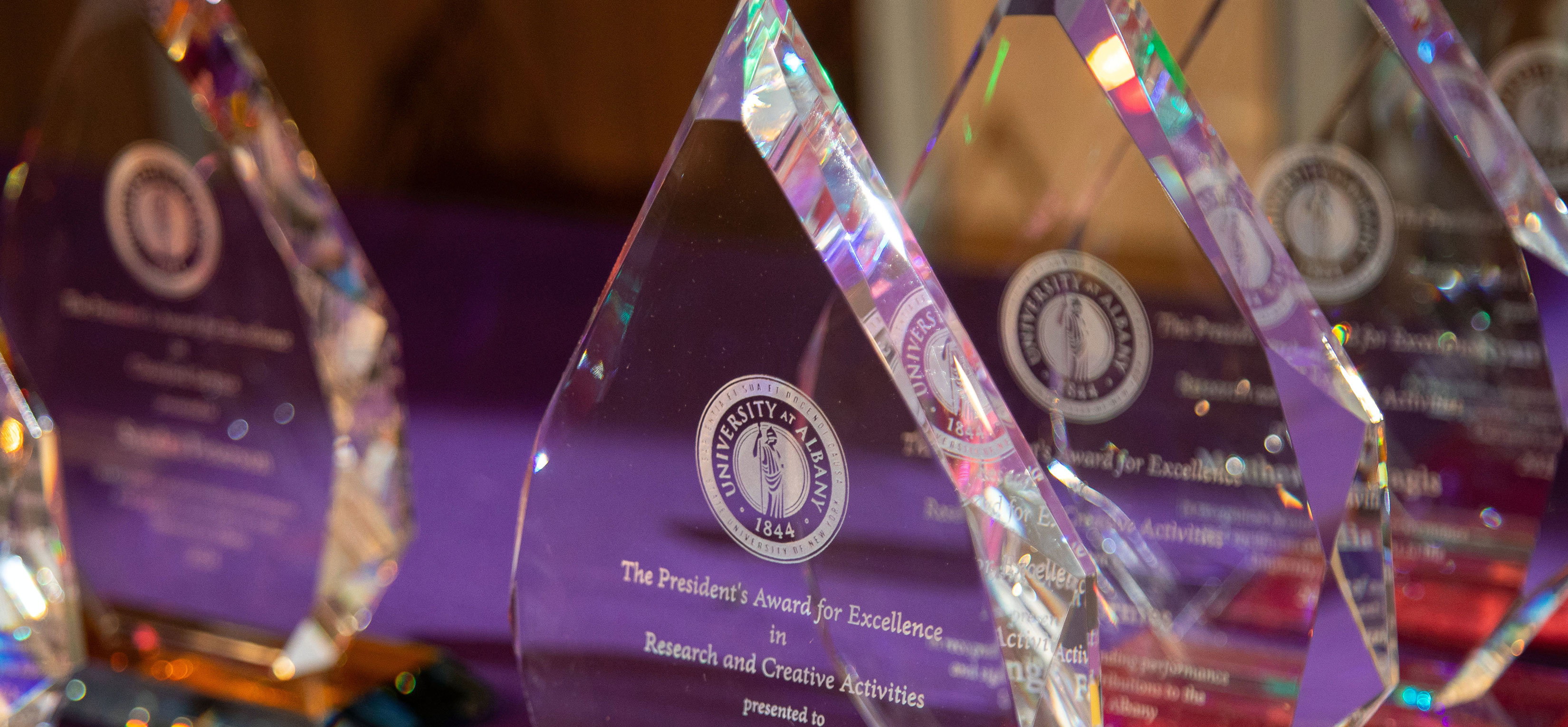
President's Awards for Excellence
The President's Awards for Excellence celebrates UAlbany employees who have demonstrated excellence in teaching, academic service, librarianship, professional service, classified service, and research and creative activities.
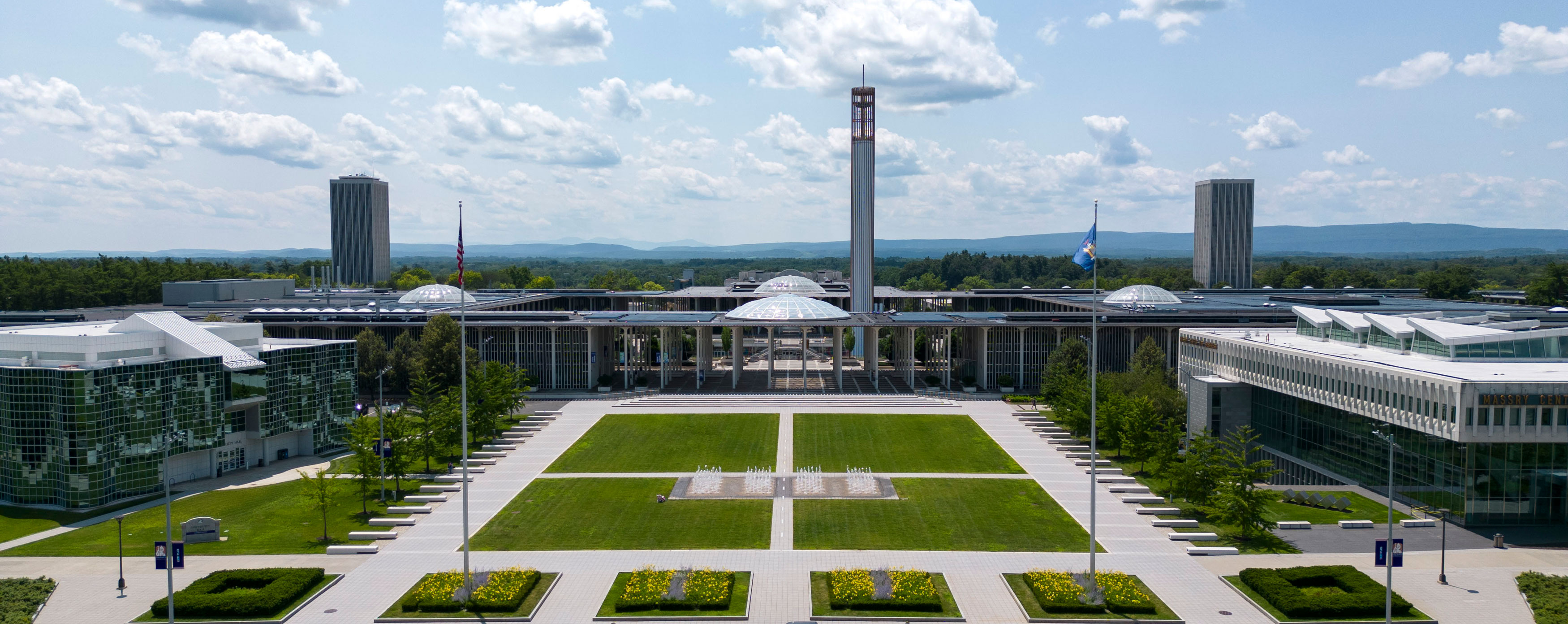
Collins Fellowship
Inaugurated in 1984, the Collins Fellowship award recognizes members of the UAlbany teaching faculty who have exhibited extraordinary devotion to this University and the people in it over a sustained period of time.
The honor bears the name of Evan Revere Collins, who as President (1949 to 1969) provided outstanding leadership in our transition from a college to a university.
About the Collins Fellowship
Collins Fellows are teaching faculty who have served the University over a sustained period of time and shown extraordinary devotion to the University.
A “sustained period of time” means that the nominee has spent a significant portion of his or her professional life in the active service of the University, preparing it for the future at all levels.
- Eligible nominees must have worked actively within the institution, not necessarily exclusively in a faculty position, for at least 10 years. Time away such as for sabbaticals or leaves are not counted toward the 10 years of service.
- Nominees may have taken on administrative positions, such as chair, associate dean, vice provost, etc.; such time in administrative service can count toward "sustained service," but it cannot be the exclusive or major service an individual has rendered in order to be a candidate for Collins Fellowship.
“Extraordinary devotion” includes service at the departmental, the college/school and the University level.
- Collins Fellows have performed extraordinary service and shown exceptional commitment and dedication to the University by supporting it at all these levels and by concerning themselves with the well-being of the people who work in the institution.
- While Fellows may have also made contributions outside the University, (such as to their discipline or to the broader academic or local community) they are specifically selected for their dedication to the University at Albany and their sustained acts of citizenship within it.
- Their contributions demonstrate breadth in the kind of service they have performed, as well as a prolonged loyalty and steadfast focus on the excellence of UAlbany, all without any thought to personal recognition or reward.
The award is unique to UAlbany and intended to acknowledge the efforts of faculty who are exemplars of the highest levels of institutional commitment and service. The Collins Fellowship is a designation separate from the UAlbany President’s Excellence Awards and SUNY Faculty Distinguished Ranks.
Each Collins Fellow receives a salary increment and a distinctive medallion. They meet with the University President on an annual or semi-annual basis to discuss important directions taken by the University and to share their thoughts on those directions with the president.
Recipients are included in University-wide convocations and academic ceremonies. Portraits of the Collins Fellows hang in the University Library and recipients are named on the University’s website.
Nomination Guidelines for Collins Fellows
Any member of the University teaching faculty except Collins Fellows may nominate a fellow faculty member by submitting, in the following order:
- A letter of nomination describing the reasons for consideration of the nominee for inclusion in the Collins Fellowship. Such letters should describe the nominee’s overall commitment to the University by:
- Explaining the extraordinary service and devotion to the University that has inspired the nominator to submit the nomination,
- Describing the nominee’s continued research productivity, and
- Describing the nominee’s commitment to teaching.
- At least three but no more than five supporting letters (in addition to the nominator’s letter), describing the activities that show “extraordinary devotion to UAlbany.”
- Of the minimum of three letters, only one letter should come from a departmental colleague and two others should come from the campus community.
- Letters may come from faculty, administrators, staff or, on occasion, students.
- Since the award is for University citizenship, letters from nominators or supporters outside the University will only be considered if they give evidence of University-related service.
- Current Collins Fellows should neither nominate nor write supporting letters for a nominee.
- The nominee’s CV
Nominees are not to know of their nomination; nominations are to be kept confidential. For additional guidance about nominations, please contact Dr. Youqin Huang (yhuang@albany.edu).
Please send full nominations electronically to Dr. Youqin Huang (yhuang@albany.edu) by February 15. If electronic submission poses a challenge or hardship, please send paper copies to:
Provost’s Office
Attention: Dr. Youqin Huang
308 University Hall
1400 Washington Avenue
Albany, NY, 12222
List of Collins Fellows
David Rousseau, Political Science & Emergency Management and Homeland Security — 2024
David Smith, Finance — 2024
Richard Fogarty, History — 2022
Janell Hobson, Women’s, Gender and Sexuality Studies — 2022
Ray Bromley, Geography and Planning — 2019
Jeanette Altarriba, Psychology — 2017
Julie Novkov, Political Science & Women's, Gender, and Sexuality Studies — 2017
Richard Hamm, History — 2016
Randall Craig, English - 2015
Stephen North, English — 2014
Kevin Williams, Psychology — 2014
John Delano, Atmospheric and Environmental Sciences — 2013
Teresa Harrison, Communication — 2013
James Acker, School of Criminal Justice — 2010
Iris Berger, History — 2010
Lindsay Childs, Mathematics — 2009
Hassaram Bakhru, College of Nanoscale Science and Engineering — 2008
Daniel Levy, Educational Administration and Policy — 2007
Steven Messner, Sociology — 2007
Richard H. Hall, Sociology — 2006
Leonard A. Slade, Jr., Africana Studies — 2005
Bruce Miroff, Political Science — 2005
David McCaffrey, Public Administration — 2004
Glenna D. Spitze, Sociology — 2004
Paul A. Leonard, Business — 2003
Edelgard Wulfert, Psychology — 2003
Peter A. Bloniarz, College of Computing and Information — 2002
Martha T. Rozett, English — 2002
Lynn Videka, Social Welfare — 2002
John S. Pipkin, Geography and Planning — 2001
Allen Ballard, History — 2000
Roberta Bernstein, Art — 2000
Ronald A. Bosco, English — 1999
Shirley J. Jones, School of Social Welfare — 1999
Sue R. Faerman, Public Administration and Policy — 1998
Vincent J. Aceto, School of Information Science and Policy — 1997
Judith E. Barlow, Women's Studies/English — 1997
Warren E. Roberts, History — 1997
Carlos Santiago, Latin American and Caribbean Studies — 1996
Susan Sherman, College of Integrated Health Sciences — 1996
Judith Baskin, Judaic Studies — 1995
Daniel Wulff, Biological Sciences — 1995
Martin Edelman, Political Science — 1994
James Fleming, Reading — 1994 (retired)
Francine Frank, Linguistics and Cognitive Science — 1993
Sung Bok Kim, Undergraduate Studies — 1993
Christine E. Bose, Sociology & Women's Studies — 1992
Helen Desfosses, Public Administration and Policy & Africana Studies — 1992
Donald J. Reeb, Economics — 1992
Stephen E. DeLong, Geological Sciences — 1991
Joan E. Schulz, English — 1991
M.I. Berger, Educational Administration and Policy — 1990
Judith Fetterley, English — 1990
Richard Clark, Educational Psychology and Statistics — 1989
Harold Story, Physics — 1989
Edna Acosta-Belen, Latin American and Caribbean Studies & Women's Studies — 1988
Eugene McLaren, Chemistry — 1988
Shirley Brown, Psychology — 1987
R. Findlay Cockrell, Music — 1987
Harold Cannon, Accounting — 1986
Margaret A. Farrell, Teacher Education — 1986
Kendall A. Birr, History — 1985
Arthur N. Collins, English — 1985
Frank G. Carrino, Hispanic and Italian Studies — 1984
Helen G. Horowitz, Economics — 1984
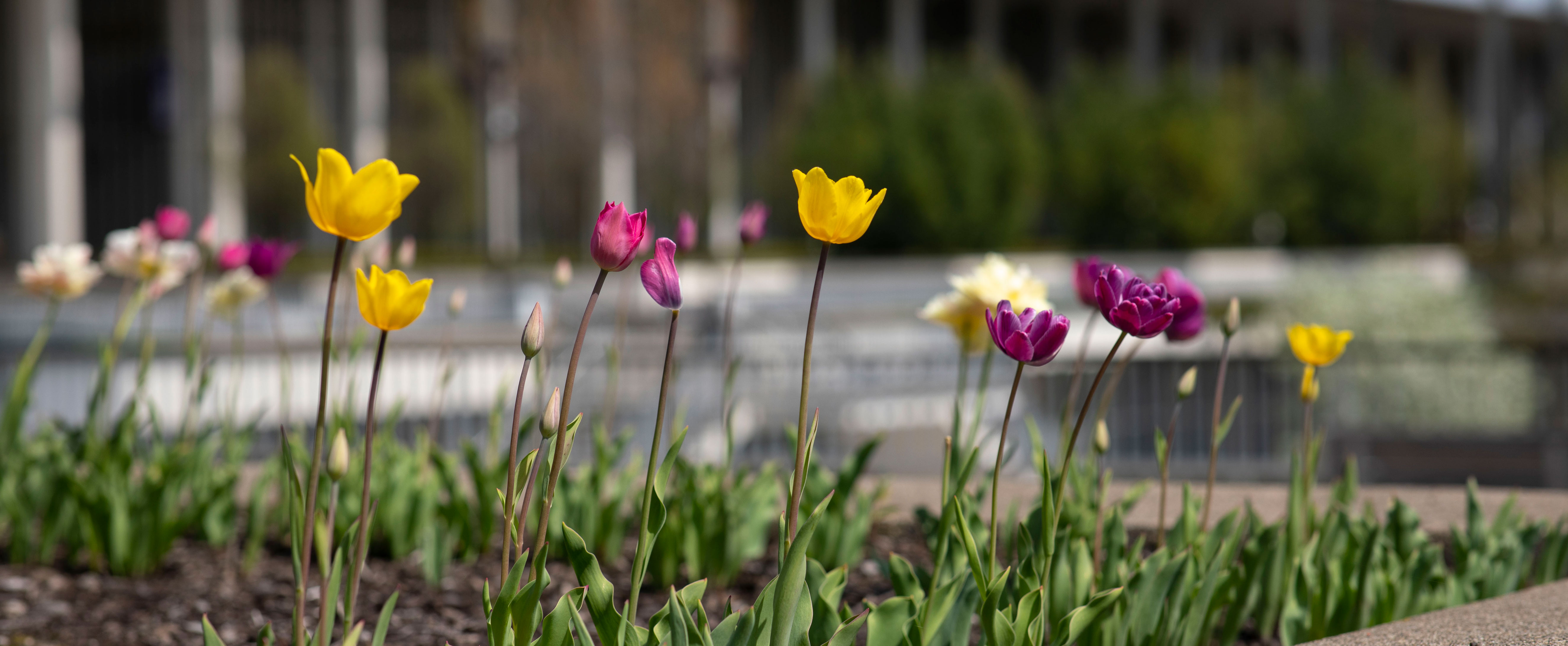
Equity and Excellence in Education Provost Fellowship
The Equity and Excellence in Education (E3) Provost Fellowship is a professional community of practice award for UAlbany STEM instructors, designed to enhance instructional practices and improve teaching and learning experiences for both instructors and students.
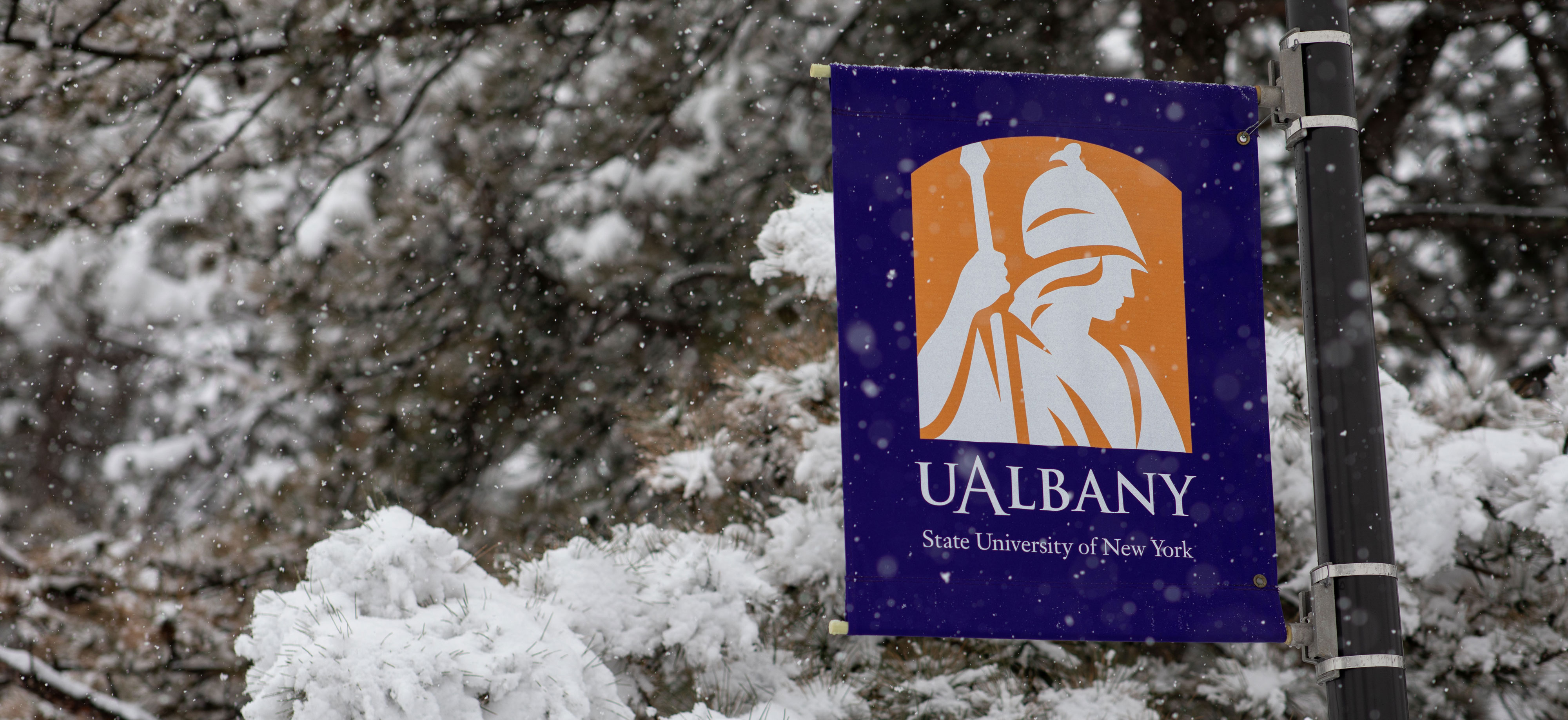
Provost's Award for Excellence in Undergraduate Advising
The Provost’s Award for Excellence in Undergraduate Advising is presented each year to UAlbany employees who have demonstrated significant and meritorious achievement in advising undergraduate students.
About the Provost's Award
Significant and meritorious achievement in advising undergraduate students can be demonstrated by evidence in the following areas:
- Aiding students in achieving their highest academic potential
- Improving communication and access between students, faculty and staff
- Developing student decision-making and problem-solving skills
- Creating or developing advising techniques or policies to better serve our diverse student body (including first-generation students, minority students, students from underserved areas, LGBT students, students with disabilities, etc.)
- Supporting students through difficult personal or academic situations
- Assisting students with preparation for graduate study or careers after degree completion
- Helping students evaluate and enhance academic and personal strengths and weaknesses
- Developing or improving processes and systems to enhance or streamline student advising on UAlbany campus
All nominees from the Professional Advising Staff must meet all the following requirements to be eligible:
- Must not have received either Provost’s Award for Excellence in Undergraduate Academic Advising Award within the last five full academic years
- Must have completed a minimum of three years of employment at UAlbany immediately prior to the semester in which the award is to be given
- Must have served in an advising role for a minimum four full academic semesters
- Must not have more than a 50% obligation in a teaching faculty line
- Must be an active employee of the University at the time of the conferral of the award
Professional staff and administrators are also eligible for this award if they are involved in undergraduate academic advising, including the administration and policy development of academic advising.
All nominees from the Teaching Faculty must meet all the following requirements to be eligible:
- Must not have received either Provost’s Award for Excellence in Undergraduate Academic Advising Award within the last five full academic years
- Must be the instructor of record of undergraduate courses for four full academic semesters
- Must have completed a minimum of three years of employment at UAlbany immediately prior to the semester in which the award is to be given
- Must have served in an advising role for a minimum four full academic semesters
- Must not have more than a 50% obligation in an administrative/professional faculty line
- Must be an active employee of the University at the time of the conferral of the award
Nomination Guidelines for the Provost’s Award
Nominations must contain a descriptive narrative to support the evidence included in the file and to explain how the nominee meets the award criteria. A complete nomination file includes the following:
- A completed Provost's Award Nomination Form
- At least four letters of support:
- One letter must be from the nominator (can be student, staff or faculty)
- One letter must be from the nominee’s direct supervisor
- If the nominator is also the nominee’s direct supervisor, the second letter can either come from a colleague or a more senior administrator within the unit or division (for example: dean, director, vice president, etc.)
- Two to four letters must be from current or former advisees
- The nominee’s résumé or vita (must include advising activities and contributions)
- The nominee’s statement or philosophy on student advising (one page maximum)
- The nominee’s statement that describes the activities in advising during the academic year for which the candidate is being nominated, including supporting materials related to the nominee’s advising activities (for example: caseload, training and workshops, office hours, advising syllabi, etc.)
The Provost’s Office will send a call for nominations each fall semester for that academic year’s Provost’s Award for Excellence in Undergraduate Academic Advising. The call for nominations will include additional details but the process will generally follow this timeline:
- Mid-February: Nomination announcement is sent out by the Provost's Office.
- Mid-March: Nominations due to the Provost’s Office.
- March to April: The review committee evaluates the nominations and makes a recommendation to the provost. The provost reviews and selects the recipient(s).
- Mid- to late-April: Successful awardees are notified of the outcome.
- May: Awards are given to the recipient(s) at a recognition event.
The full nomination file must be submitted electronically, in PDF format, to the Office of the Provost (provost@albany.edu).
Questions about the Provost’s Award for Excellence in Undergraduate Advising can be directed to Kristen Swaney, Director of the Academic Support Center (kswaney@albany.edu).
List of Provost's Award Winners
Hope-Hildreth Lifetime Achievement Award for Excellence in Academic Advising
- Monica Hope (2018)
- Anne Hildreth (2018)
Provost’s Award for Excellence in Undergraduate Advising
2024-2025
- Lisa Clarke
- Keith Nuñez
- Leslie Saint-Vil
- Jildyz Urbaeva
2023-2024
- John Donoghue
- Christopher Gebhardt
- Joseph Murphy
2022-2023
- Zakhar Berkovich
- Kathryn Fore
- Brandon Lewis
- Marcelle Martens
2018-2019
- Stacey Zyskowski
- Vanessa Borum
2017-2018
- Michael Geroux
- Karen Williams
2016-2017
- Jason Cotugno
- Rachel Moody
- Claudio Gomez
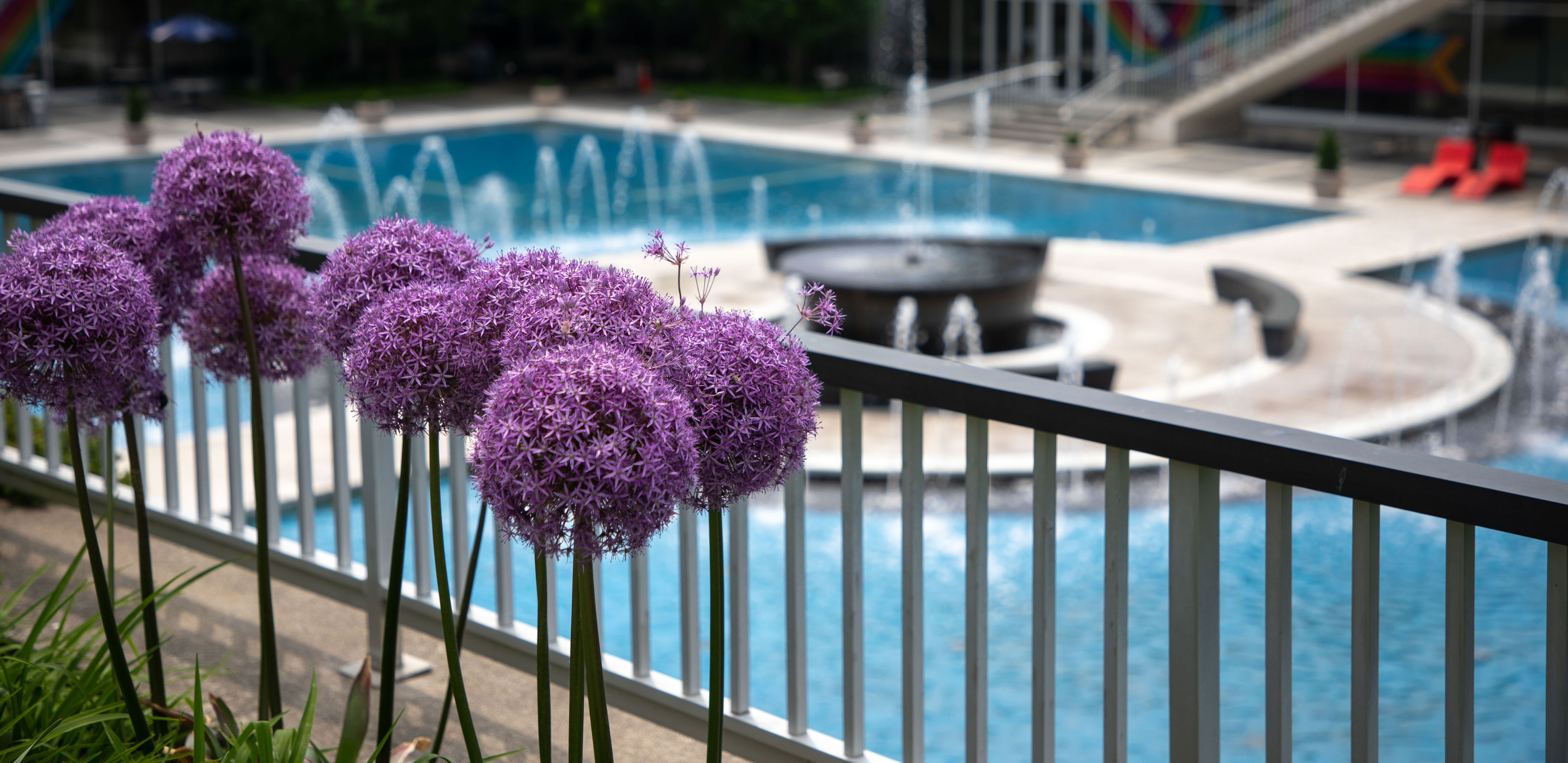
Honorary Degrees
The honorary doctorate degree is the highest form of recognition offered by SUNY to persons of exceptional distinction.
UAlbany has offered honorary degrees in five categories. Review SUNY's Policy on the Awarding of Honorary Degrees for more information.
Doctors of Fine Arts
Nora Lum (Awkwafina) — 2024
Caryl Phillips — 2024
Philip Morris — 2014
John Mesick — 1986
Doctors of Humane Letters
Barbara Smith — 2015
Hamdi Ulukaya — 2013
Rachael Ray — 2012
Morris Massry — 2007
Seung Park — 2007
Louis Tomson — 2007
Deborah Willen Meier — 1998
Roger Wilkens — 1998
Matilda White Riley — 1997
Miles Lerman — 1994
Jaroslav Pelican — 1993
Catharine R. Stimpson — 1992
Emmanuel Le Roy Ladurie — 1991
Robert M. Solow — 1991
Thomas Krens — 1989
Lloyd Edgard Ohlin — 1989
Gerhard L. Weinberg — 1989
Benoit B. Mandelbrot — 1988
Andrew Aikin Rooney — 1988
Alvin F. Poussaint — 1988
Rose Marie Karpinsky — 1987
Danna E. Shalala — 1987
Charles E. Lindblom — 1986
Robert K. Merton — 1986
Arthur M. Schlesinger Jr. — 1984
Alice M. Rivlin — 1983
Isaac Bashevis Singer — 1981
Doctors of Laws
Judith Smith Kaye — 2007
Vincent O’Leary — 2006
Richard C. Wesley — 2006
John Lewis — 2001
Richard G. Lugar — 1997
Doctors of Letters
Gregory Maguire — 2011
David McCullough — 1999
Joseph E. Persico — 1996
Nicholasa Mohr — 1989
Alfred Kazin — 1987
Doctors of Science
Jürgen Popp — 2023
Larry Gold — 2015
Thomas D’Ambra — 2014
Jack Henion — 2013
Neal F. Lane — 2002
Edward O. Wilson — 1999
Donald N. Landenberg — 1998
Carl Sagan — 1994
Joanne Simpson — 1991
Halfdan Mahler — 1990
James W. Mayer — 1988
Xie Xide — 1987
Marshall W. Nirenberg — 1986
Verner E. Suomi — 1983
Chien-Shiung Wu — 1982
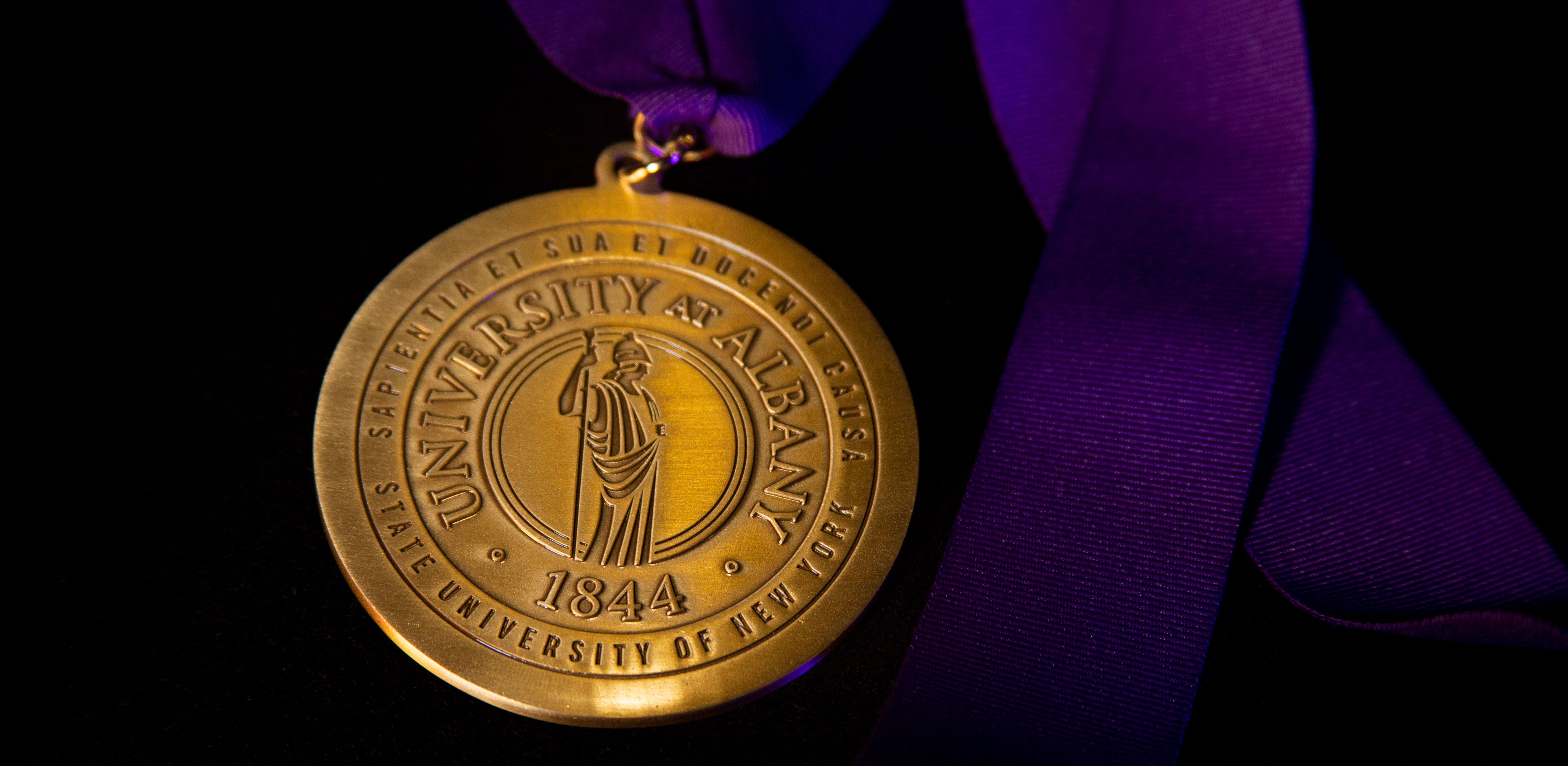
Medallion of the University
The Medallion is UAlbany’s highest honor for distinguished service, expressing admiration and appreciation for extraordinary public service and leadership.
Recipients must have demonstrated a profound commitment to the interconnectedness of academic excellence, cultural richness and economic vibrance and the central role that public higher education plays in uplifting lives and communities.
First awarded in 1978, the Medallion has since been bestowed more than two dozen times to leaders in business, education and government.
Medallion Recipients
- William Kennedy, Pulitzer Prize-winning novelist and founder of the New York State Writers Institute
- Neil D. Breslin, New York State Senator
- H. Carl McCall, former New York State Comptroller and SUNY Board of Trustees Chairman
- Mario M. Cuomo, former New York State Governor
- Daniel Patrick Moynihan, former U.S. Senator
- J. Spencer Standish, former Albany International Corporation chairman and former UAlbany Foundation director
- Hugh T. Farley ’58, former New York State Senator
- Steve Kroft, former “60 Minutes” correspondent
- Catherine Bertini ’71, former U.N. Under Secretary General and 2003 World Food Prize Laureate
- Daniel Tomson, former University Council chair
- Gerald Jennings ’76, former City of Albany mayor
- Carol Gilligan, feminist, ethicist and psychologist
- Michael H. Steinhardt, philanthropist
- Edgar M. Bronfman Sr., former World Jewish Congress president
- Joseph Bruno, former State Senate Majority Leader
- J. Vanderbilt Staub, former University Council chair


